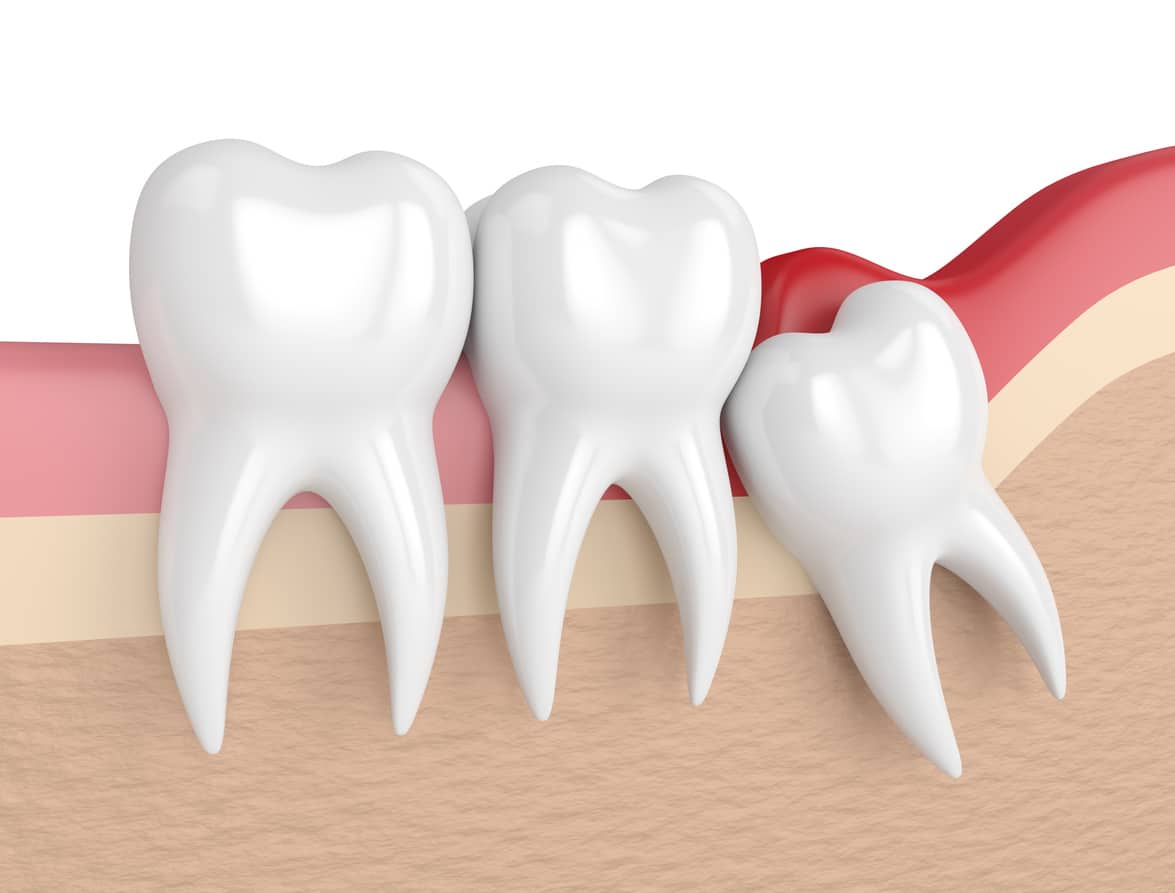Why Does My Wisdom Tooth Hurt?

Wisdom teeth can cause pain due to impaction or infection, affecting the surrounding area. This discomfort can be caused by the tooth growing at an angle or not having enough space to fully emerge, leading to inflammation and pressure on the nearby gums and nerves.
Having wisdom tooth pain can be a distressing experience. Wisdom teeth, also known as third molars, are the last teeth to erupt in the mouth, usually during the late teens or early twenties. While some individuals may have no issues with their wisdom teeth, others can experience significant discomfort.
The pain associated with wisdom teeth often arises from impaction, which occurs when the tooth grows at an angle or lacks enough space to fully emerge. This condition can lead to inflammation, infection, and pressure on the surrounding gums and nerves. We will delve into the reasons why your wisdom tooth might be hurting and discuss potential treatment options to alleviate the pain.
Understanding Wisdom Teeth
htmlWisdom teeth are the third and final set of molars that typically emerge during a person’s late teens or early twenties. These teeth can cause significant pain and discomfort due to various reasons.
What Are Wisdom Teeth?
Wisdom teeth, also known as third molars, are the last set of teeth to erupt in the mouth. They are located at the back corners of the mouth, and most adults have four wisdom teeth.
When Do They Typically Develop?
Wisdom teeth usually start developing between the ages of 17 and 21. However, the timing can vary from person to person. Some individuals may experience earlier or later eruption of their wisdom teeth.
How Many Are There?
| Number of Wisdom Teeth | Description |
|---|---|
| None | Some individuals may never develop wisdom teeth. |
| Two | Some people may only have two wisdom teeth. |
| Four | The majority of people have four wisdom teeth, one in each corner of the mouth. |
If wisdom teeth do not have enough space to fully emerge or they grow in an irregular position, they can cause various issues, including pain, swelling, infection, and damage to adjacent teeth. It’s essential to consult a dentist if you experience wisdom tooth pain or any related symptoms.
Common Symptoms Of Wisdom Tooth Pain
The eruption of wisdom teeth can often lead to discomfort and pain. One of the common symptoms experienced is pain in the back of the mouth. This pain can range from a dull ache to sharp, intense pain. Swelling and inflammation around the area of the impacted tooth can also occur, causing further discomfort. Another symptom that individuals may experience is difficulty in opening the mouth fully due to the limited space and pressure from the erupting tooth.
It is important to note that not everyone will experience these symptoms, as everyone’s wisdom tooth eruption process can differ. However, if you are experiencing any of these symptoms, it is recommended to consult with a dentist to determine the best course of action.
Causes Of Wisdom Tooth Pain
Wisdom tooth pain can be caused by a variety of factors, including:
| Impacted Wisdom Teeth | Gum Infections | Tooth Decay or Cavities |
|---|---|---|
| When wisdom teeth do not have enough space to grow properly, they can become impacted. Impacted wisdom teeth can cause pain and discomfort as they push against neighboring teeth. | Gum infections such as pericoronitis can occur when the gum tissue around a partially erupted wisdom tooth becomes swollen and infected. | Wisdom teeth are located at the back of the mouth, making them difficult to reach and clean properly. This can lead to tooth decay or cavities, which can cause pain and sensitivity. |
It is important to consult a dentist if you experience wisdom tooth pain. They can assess the situation and recommend appropriate treatment options. Wisdom tooth pain should not be ignored, as it can worsen over time and lead to other dental complications.
Diagnosis And Examination
Wisdom tooth pain can be a distressing experience, and seeking proper diagnosis and examination from a dentist is crucial. During the examination, the dentist will thoroughly assess the condition of your wisdom tooth. X-rays and imaging techniques may be employed to get a detailed look at the impacted tooth and its surrounding structures.
Additionally, the dentist will be on the lookout for any signs of infection or decay. These may include redness, swelling, or tenderness in the affected area, as well as the presence of pus or an unpleasant odor. By gathering all the necessary information through a comprehensive examination, your dentist can accurately diagnose the cause of your wisdom tooth pain.
Once a diagnosis is made, the dentist can then outline the appropriate treatment plan. This may involve prescribing medications to alleviate pain and infection, or referring you to an oral surgeon for extraction if necessary.
Treatment Options For Wisdom Tooth Pain
Wisdom tooth pain is a common dental issue that can be quite discomforting. Fortunately, there are several treatment options available to relieve the pain.
Over-the-counter pain relievers can help reduce inflammation and alleviate the discomfort. Medications containing acetaminophen or ibuprofen are commonly recommended for temporary relief.
Another effective way to ease wisdom tooth pain is to use warm saltwater rinses. Gently swishing a solution of warm water and salt in your mouth can help reduce swelling and cleanse the area.
In some cases, extraction of the wisdom tooth may be necessary if the pain persists or if there are complications such as infection or impaction. An oral surgeon can evaluate the situation and recommend the best course of action.
It’s important to consult a dental professional for an accurate diagnosis and personalized treatment plan if you are experiencing wisdom tooth pain. They can provide guidance on the most suitable treatment option for your specific case.
Non-surgical Treatment Options
Non-surgical treatment options for wisdom tooth pain include cleaning and antibiotics, dental fillings or repairs, and anti-inflammatory medications. Cleaning the affected area can help remove any infection or debris and promote healing. Antibiotics may also be prescribed to manage infection. Dental fillings or repairs can be used to address any cavities or cracks in the wisdom tooth that may be causing the pain. Finally, anti-inflammatory medications can be taken to reduce pain and swelling. These treatment options focus on providing relief and promoting healing without the need for surgery.
Surgical Treatment Options
Wisdom Tooth Pain Management Tips
Proper oral hygiene practices play a crucial role in relieving wisdom tooth pain. Regularly brushing your teeth twice a day with a soft-bristled toothbrush and using fluoride toothpaste helps prevent bacterial growth and cavities. Furthermore, gently rinsing your mouth with warm saltwater can provide temporary relief.
When experiencing wisdom tooth pain, it is essential to avoid hard and crunchy foods that can aggravate the discomfort. Instead, opt for soft foods such as soups, mashed potatoes, and yogurt. Additionally, applying ice packs wrapped in a thin cloth to the affected area can help reduce swelling and numb the pain temporarily.
Remember, wisdom tooth pain management is a temporary solution. It is advisable to schedule an appointment with your dentist to evaluate the cause of the pain. Your dentist may recommend wisdom tooth extraction if they determine it necessary.
Complications And Risks Of Ignoring Wisdom Tooth Pain
Ignoring wisdom tooth pain can lead to various complications and risks. One major risk is the spread of infection to nearby teeth. When an impacted wisdom tooth is left untreated, it can create a breeding ground for bacteria, causing an infection that can easily spread to the adjacent teeth. This can result in the decay and damage of otherwise healthy teeth.
Another potential complication is the formation of an abscess. If the impacted wisdom tooth remains untreated, an abscess can develop, causing a pus-filled pocket to form near the tooth. This can lead to severe pain, swelling, and even difficulty in opening the mouth.
Furthermore, ignoring wisdom tooth pain can cause shifting of the surrounding teeth. Wisdom teeth, when they erupt at an incorrect angle or position, can exert pressure on the neighboring teeth. This pressure can gradually cause the nearby teeth to shift, leading to misalignment and potential bite problems.
It is crucial to address wisdom tooth pain promptly and seek professional dental care as soon as possible to prevent these complications and risks.
Preparing For Wisdom Tooth Extraction
Wisdom tooth pain is a common concern for many people. If you are experiencing discomfort or pain related to your wisdom teeth, it may be a sign that they need to be extracted. Preparing for wisdom tooth extraction can help alleviate the pain and prevent further complications.
During the procedure, your dentist or oral surgeon will numb the area with local anesthesia to ensure your comfort. They will then carefully remove the wisdom teeth, sometimes needing to make small incisions to access them. The duration of the procedure will depend on the complexity of your case.
After the extraction, it is important to prepare for recovery at home. You may experience some swelling and discomfort for a few days, so it is recommended to rest and avoid strenuous activities. Applying ice packs to the affected area can help reduce swelling.
| Post-Operative Dietary Restrictions |
|---|
| Avoid eating hard, chewy, or crunchy foods that may irritate the extraction site. |
| Stick to soft and easy-to-chew foods such as soups, mashed potatoes, and yogurt. |
| Stay hydrated and drink plenty of water, but avoid using straws as the suction can dislodge the blood clot. |
| Follow any specific dietary instructions given by your dentist or oral surgeon. |
By following these guidelines, you can ensure a smoother recovery process and reduce the risk of complications. Remember to attend any follow-up appointments as scheduled to monitor your healing progress.
Myths Surrounding Wisdom Teeth
Wisdom teeth, also known as third molars, often cause discomfort and pain when they emerge in the late teens or early twenties. One common misconception is that these teeth cause headaches. However, the actual cause of headaches is more likely related to other factors such as stress, sinus issues, or tension.
Another myth is that wisdom teeth are responsible for changes in facial appearance. While impacted or misaligned wisdom teeth can potentially affect facial structures, it’s important to prioritize other dental and orthodontic concerns for significant facial changes. Additionally, some individuals believe that wisdom teeth problems result in sinus issues. While wisdom teeth can occasionally exert pressure on the sinuses, chronic sinusitis is typically caused by other factors such as allergies or infections.

Credit: www.pickettfamilydental.com
Frequently Asked Questions On Why Does My Wisdom Tooth Hurt?
How Do You Make Wisdom Tooth Pain Go Away?
To alleviate wisdom tooth pain, try these remedies: rinse with warm saltwater, apply a cold compress, take over-the-counter pain relievers (consult a dentist first), chew on cloves or use numbing gels. However, consult a dentist if the pain persists or worsens.
How Long Does Wisdom Tooth Pain Usually Last?
Wisdom tooth pain typically lasts for a few days to a week. The duration can vary depending on factors like the tooth’s position, the presence of infection, and individual healing abilities. Regular pain relief methods and oral hygiene can help alleviate discomfort.
When Should You Be Worried About Wisdom Tooth Pain?
You should be worried about wisdom tooth pain if it is severe, lasts for more than a few days, or is accompanied by swelling or infection. It’s essential to seek dental care to prevent further complications and ensure proper treatment.
Why Does My Wisdom Tooth Hurt?
Wisdom tooth pain can occur due to various reasons like impaction, infections, cavities, or gum inflammation. When the wisdom tooth doesn’t have enough space to grow properly, it can press against nearby teeth, causing pain. In some cases, partially erupted wisdom teeth can trap food particles, leading to bacterial growth and pain as well.
It’s best to consult a dentist for an accurate diagnosis and treatment options.
Conclusion
The pain associated with wisdom teeth can be caused by various factors such as impaction, infection, or overcrowding. It is crucial to consult with a dentist to determine the exact cause and receive appropriate treatment. Maintaining good oral hygiene and regular dental check-ups can help prevent complications and alleviate discomfort in the long run.
Remember, taking care of your oral health is essential for overall well-being.





